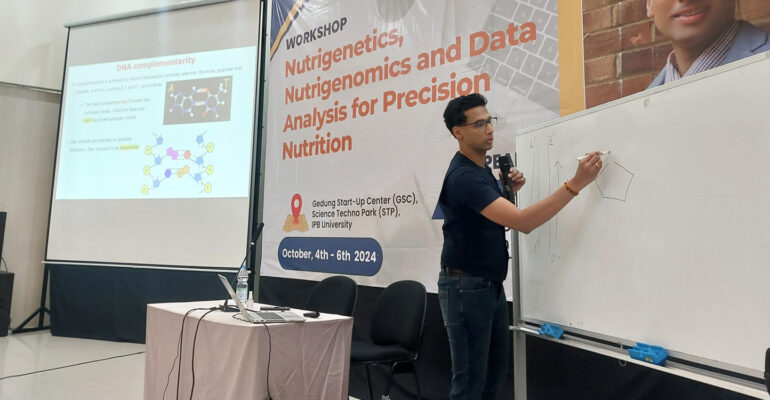IPB University’s Department of Nutrition Science Presents Nutrigenetics and Nutrigenomics Experts from the University of Reading

The Department of Nutrition Science, Faculty of Human Ecology (Fema) IPB University successfully organised a series of Visiting Professor Program activities (2-7/10). This event includes public lectures, conferences, and workshops titled ‘Nutrigenetics, Nutrigenomics, and Data Analysis for Precision Nutrition’.
The activity was held with the support of the International Research Institute (LRI) for Food, Nutrition, and Health of IPB University through the Inter-University Excellence Centre Grant Program (PUAPT) 2024.
In this program, the Department of Nutrition Science presents Prof Vimal Karani S, a professor in the field of nutrigenetics and nutrigenomics from the Department of Food and Nutritional Sciences, University of Reading, England. Prof Vimal is also the Deputy Director of the Institute for Food, Nutrition, and Health, University of Reading.
During her visit, Prof Vimal became a speaker and instructor in the workshop that lasted for three days. This workshop was held at the Startup Centre Building (GSC), Science Techno Park IPB University and was attended by 35 participants consisting of lecturers from the Department of Nutrition Science, as well as students of the S1, S, S3, in Nutrition Science and the IPB University Dietetics Professional Education program.
The first day’s activity began with a speech from Dr Zuraidah Nasution, Secretary of the Department of Nutrition Science. She hopes that this activity can expand the participants’ insights on nutrition and nutrigenomics and provide benefits in improving the ability to process data related to genetic and health information using Statistical Package for the Social Sciences (SPSS) software.
“This is an interesting topic because this workshop not only offers lectures, but also analyses SPSS data practically. We hope this workshop can broaden our horizons and improve our research, especially in the fields of Nutrigenetics and Nutrigenomics. Stay involved and take full advantage of the knowledge that will be shared by Prof Vimal,” said Dr Zuraidah.
The workshop was then continued with the presentation of material by Prof. Vimal which included basic genetics such as cell organelles, DNA, RNA, to genetic epidemiology, as well as material on nutrition, nutrigenomics, and epigenetics.
In her presentation, Prof Vimal said that every individual has a unique genetics that is influenced by the environment. For example, if a person has a gene that increases the risk of obesity and is surrounded by a supportive environment, such as often eating fast food and not exercising enough, the risk will increase.
“However, by implementing a healthy lifestyle and maintaining the balance of the intestinal microbiota, this high risk can be turned into a low risk,” she explained.
The second day is focussed on data analysis practice using SPSS. In this session, Prof Vimal guided the participants directly in analysing data related to genetic and health information. On the third day, the activity ended with an assessment test, discussion, and closing.
The participants were very enthusiastic during the workshop activities. They asked a lot of questions and discussed directly with Prof. Vimal. After the workshop activity ends, participants are also asked to give their feedback regarding this workshop activity. They stated that this workshop is very interesting and the material is conveyed very clearly and easy to understand.
“In the future, it is hoped that the cooperation with the University of Reading can continue with various other academic activities,” hoped Dr Zuraidah. (*/Rz) (IAAS/IAN)



